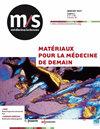异柠檬酸脱氢酶1/2突变急性髓系白血病的代谢和治疗。
IF 0.6
4区 医学
Q4 MEDICINE, RESEARCH & EXPERIMENTAL
引用次数: 0
摘要
异柠檬酸脱氢酶IDH1和IDH2是中枢和能量代谢的关键酶,在急性髓性白血病(AML)中经常发生突变。它们催化肿瘤代谢物r -2-羟基谷氨酸盐的产生,这在白血病发生和AML标准治疗后患者复发中起着关键作用。尽管最近引入的IDH1 (ivosidenib)和IDH2 (enasidenib)选择性抑制剂改善了IDH1-和IDH2-突变AML患者的预后,但已经确定了对这些治疗的几种耐药机制,包括代谢重编程。这些机制的研究为监测和治疗该亚型AML患者开辟了新的治疗机会。本文章由计算机程序翻译,如有差异,请以英文原文为准。
[Metabolism and therapy in acute myeloid leukemia with isocitrate dehydrogenase 1/2 mutations].
Isocitrate dehydrogenase IDH1 and IDH2, key enzymes in central and energy metabolism, are frequently mutated in acute myeloid leukemia (AML). They catalyze the production of the oncometabolite R-2-hydroxyglurate, which plays a key role in leukemogenesis and relapse of patients after standard AML treatments. Although the recent introduction of selective inhibitors of IDH1 (ivosidenib) and IDH2 (enasidenib) has improved the prognosis of patients with IDH1- and IDH2-mutant AML, several mechanisms of resistance to these treatments have already been identified, including metabolic reprogramming. The study of these mechanisms has opened up new therapeutic opportunities for the monitoring and treatment of patients with this subtype of AML.
求助全文
通过发布文献求助,成功后即可免费获取论文全文。
去求助
来源期刊

M S-medecine Sciences
医学-医学:研究与实验
CiteScore
0.80
自引率
14.30%
发文量
182
审稿时长
4-8 weeks
期刊介绍:
m/s offers high-quality review articles in French, covering all areas of biomedical and health research, in a monthly magazine format (10 issues / year). m/s is read by the whole French-speaking community, in France but also in Belgium, Switzerland, Canada, Morocco, Algeria, Tunisia etc. m/s is not a primary publication, and thus will not consider unpublished data. Most articles are invited by the Editors, but spontaneous proposals are welcomed. Each issue combines news and views on the most recent scientific publications, as well as broadly accessible and updated review articles on a specific topic, and essays on science and society, history of science, public health, or reactions to published articles. Each year, m/s also publishes one or two thematic issues focused on a research topic of high interest. All review articles and essays are peer-reviewed.
 求助内容:
求助内容: 应助结果提醒方式:
应助结果提醒方式:


